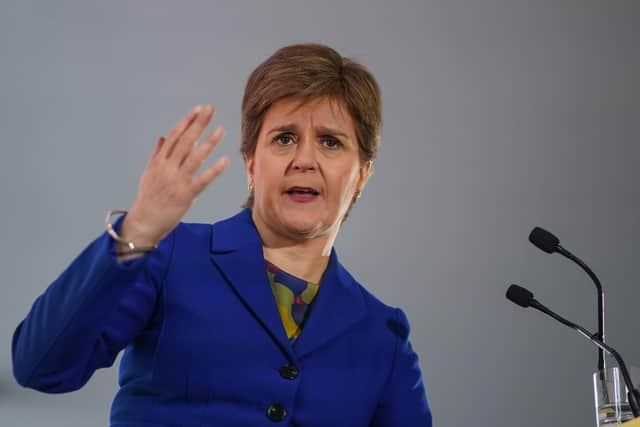Why it's long past time for SNP to enter period of self-examination - Euan McColm
Self-examination is messy but necessary if we want to understand how our actions impact on our lives and the lives of others. Without it, we risk blundering on, half-formed, oblivious to our flaws.
You’re perfectly well-balanced, of course, but you will know someone whose inability to question their own motives and actions is problematic, perhaps even exhausting.
Advertisement
Hide AdAdvertisement
Hide AdThis need to audit behaviour doesn’t stop with the individual. It’s essential that organisations – businesses, religious bodies, public institutions and political parties – do the same.


It occurred to me a few days ago, as a press release arrived declaring support for Scottish independence had “soared’, that it’s long past time for the SNP to enter a period of self-examination.
The party’s latest claim was based on a single poll, which, excluding “don’t knows”, gives the pro-independence movement a slight lead over its pro-UK opposition. It does not, however, reveal a nationalist majority.
We have been here, before. Countless times. Barely a single week has passed since defeat for the Yes campaign in the 2014 independence referendum when the SNP hasn’t claimed a rush of support for independence.
Indeed, Nicola Sturgeon seems to have sustained her popularity with party members by telling them this – what they want to hear – rather than the truth, which is that achieving their shared objective is no straightforward matter.
There has been no self-examination in the SNP over the past eight years. Rather, the party has continued to make the same claims about the Union and about the ease of the secession process that were rejected by a majority of voters.
Perhaps it is unsurprising that a party led by Nicola Sturgeon is so uninterested in reflecting on its course. The First Minister’s views on the constitution were, after all, cemented in childhood. She joined the SNP at 16 and has maintained her position ever since.
There may, I suppose, be little room for self-examination within a nationalist party. Nationalism is, in many regards, a faith-based ideology, its adherents required to believe only in its benefits. Regardless of any evidence, downsides are to be treated as heresy. Thus, someone asking perfectly legitimate questions about, say, the viability of whatever currency proposal the SNP chooses to trot out is to be marked as a fear-monger interested only in talking Scotland down.
Advertisement
Hide AdAdvertisement
Hide AdThere is a tendency among those who don’t ask questions of themselves to blame others for their woes. A man who lacks any degree of self-awareness will often feel a sense of victimhood.
This applies, equally, to the SNP. Since the UK Supreme Court ruled – or more, accurately, confirmed – the Scottish Government had no power to run a referendum next year or, indeed, at any time, the nationalists have told a story of democracy denied.
It doesn’t matter this is untrue. For all its talk of mandates, the SNP cannot win the right to enact legislation. Sturgeon seeks to blame others for the fact she misled her supporters into believing otherwise.
Things might have been so different.
When the Yes campaign was defeated in 2014, it was clear that its failure to provide answers on matters such as the economy, borders and currency had played some part. These were – and remain – serious issues and, privately, some SNP figures were willing to concede that they had simply come up short when it came to the provision of compelling information on how they might be handled. “Our proposal,” one SNP MP told me, “was tested to destruction. We didn’t have the answers people wanted.”
Others in the SNP felt the same, but rather than taking a breath then starting to work on filling these gaps in their plans, the party – under Sturgeon’s leadership – preferred to paint itself and its supporters as victims of a dishonest Unionist campaign. If it hadn’t been for the BBC or the Treasury or any number of institutions that had conspired against the Scottish people, the Yes campaign would have won, easily.
Sturgeon should have been honest with her supporters. Not only should she have told them that, in fact, the nationalist movement had work to do on its plan, she should also have made clear that securing agreement to run a second referendum would not be easy.
Instead, as tens of thousands of excitable new members joined the SNP’s ranks, the First Minister continued to promise that a second vote was within reach. And her party continued to insist, as it did last week, that support for independence was soaring.
Sturgeon is now on a course that looks likely to end with the termination of her political career. Her announcement the next general election will be a “de-facto” referendum was, to be generous, foolish. Even if the SNP wins more than 50 per cent of the popular vote in Scotland, she will have no more right to begin talks to break up the UK than she does today.
Advertisement
Hide AdAdvertisement
Hide AdUnionist parties have already made it perfectly clear they have no interest in going along with the suggestion the election should be seen as a proxy referendum. If nationalist parties such as the SNP and the Greens win more than 50 per cent of the vote, pro-UK parties will shrug. If the nationalists win the support of fewer than half of Scots, Unionists will say that Nicola Sturgeon had her de-facto referendum and she lost. She is now leading her supporters into a lose-lose scenario.
If polls start to show, consistently, that a majority of Scots want a referendum, then no UK Government could withhold permission.
Right now, the nationalist movement isn’t being thwarted by Westminster, it’s being thwarted by its own failure to examine where it went wrong in the past.
Comments
Want to join the conversation? Please or to comment on this article.